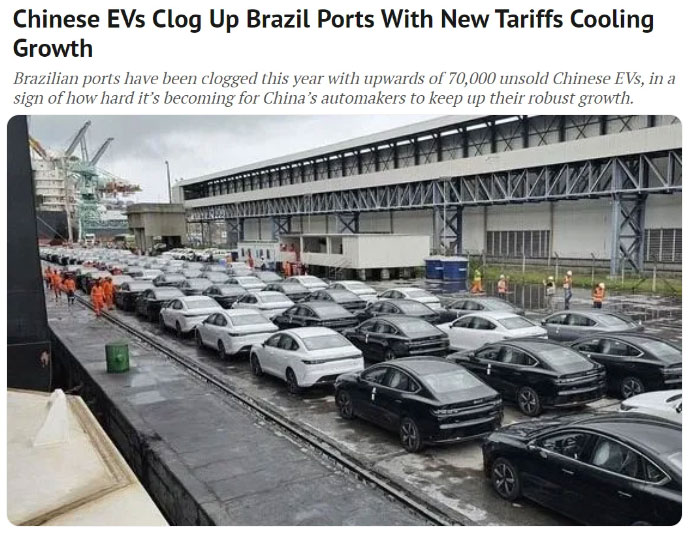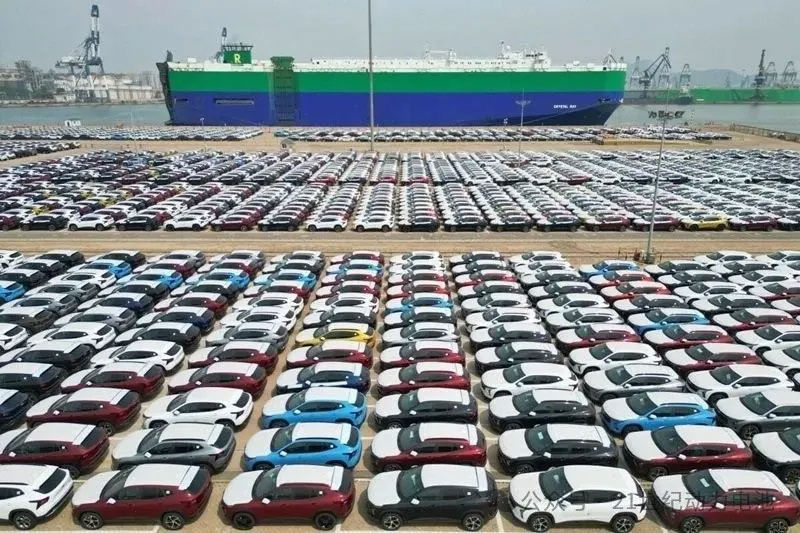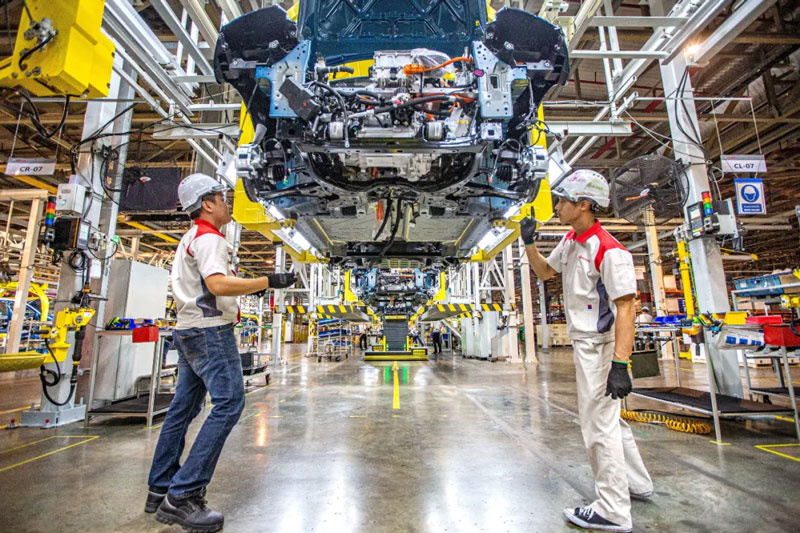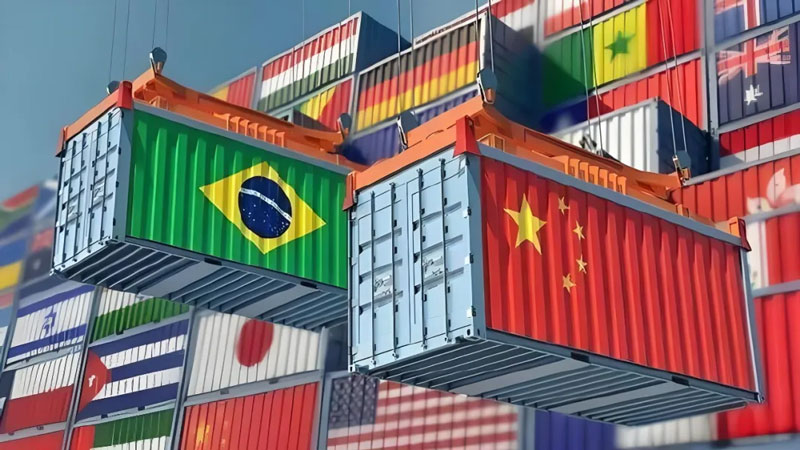

Brazil's ports are full of electric cars, and Trump's new tariffs are a mistake
More than 70,000 unsold Chinese electric vehicles (EVs) have piled up at Brazilian ports this year in response to import tariffs, Bloomberg reported, underscoring the daunting challenge Chinese automakers face in maintaining robust growth.
In addition, China dominates the market for photovoltaic products in Brazil, but Brazil has raised import tariffs on Chinese photovoltaic modules and other goods since 2024, and imposed tariffs on a variety of Chinese goods, including optical fiber, steel, sodium chlorite, metal foils, sprays, titanium dioxide and polyester fibers. Brazil has also launched anti-dumping investigations into a wide range of Chinese products.
In the field of cross-border e-commerce, Brazil has terminated the "low-value small bags duty-free" policy and imposed high import taxes on cross-border packages below a certain value, making China's cross-border e-commerce hit hard in the Brazilian market. Brazil is one of the most difficult countries in the world to clear customs, and its e-commerce market is growing rapidly, but the new tax policy makes the space for cross-border e-commerce in the market increasingly narrow.
The main reason these cars are piling up at ports is to avoid new tariffs. Local rivals have responded forcefully by increasing their options and investments in electric vehicles. In addition, the growth rate of electric vehicles in Brazil has slowed as it has in most parts of the world. "The good times are over," said Alexander Seitz, chairman of the executive board of Volkswagen AG in South America.
Byd's sales are expected to top $100 billion this year, and Brazil accounts for a large portion of that. Brazil is BYD's biggest overseas market, where it has faced resistance from governments in the U.S. and Europe.
In the last decade, Brazil exempted electric cars and hybrids from a 35% import tax in order to promote the development of the electric vehicle industry. This has attracted Chinese carmakers and created a huge market for them. Yet traditional local manufacturers -- almost all subsidiaries of global companies like General Motors -- have all but ignored electric cars and hybrids.
Byd brought its first cars to Brazil in 2021 and accelerated exports last year. Its cheapest model, priced at just 115,800 reais (about $19,100), was cheaper than conventional fuel cars and quickly gained market share. Domestic manufacturers have responded by cutting prices on some models by as much as 30 percent.
Brazilian automakers lobbied for the import tax to be reinstated and eventually won the support of President Luiz Inacio Lula da Silva. Lula's government returned to power in January 2023 and began reinstating the tax at a 10% rate a year later, with plans to gradually increase it to 35% by mid-2026.
According to the Brazilian Automobile Manufacturers association (Anfavea), the share of electric vehicles in total car sales in Brazil almost doubled from 3.5 percent in the same period last year to 7 percent in January this year, but has remained roughly at that level since then. In a country that is just beginning to build charging stations, it is becoming increasingly difficult to find new consumers willing to buy electric cars. In addition, Brazil's vast size and long distances between cities have also heightened concerns about the range of electric vehicles.
To accelerate adoption, BYD and Great Wall plan to become more aggressive in 2025. Both companies plan to build factories in Brazil. Byd is expected to start production in Brazil in March, its first electric car factory outside Asia. Great Wall Motor also expects to start operating its Brazilian plant in May next year.
"Chinese automakers will try to conquer the country from a car market point of view, and we need to see how to deal with that," said Volkswagen's Seitz. "At the end of the day, competition is always good. It forces us to re-examine ourselves."
Established automakers, including Volkswagen, Toyota and Renault, also plan to invest more than 100 billion reais (about $20 billion) in the next few years to develop hybrid models.
However, Brazil has made repeated moves against Chinese products. In the field of photovoltaic products, Chinese photovoltaic module products occupy an absolute dominant position in the Brazilian market, with a market share of up to 99%. However, since January 1, 2024, the Brazilian government has restored the import tariff policy on photovoltaic modules and wind turbines, of which the import tariff rate for photovoltaic modules was initially set at 10.8%. Surprisingly, on November 15 at the end of the year, Brazil's Ministry of Development, Industry, Trade and Services (MDIC) further announced that the import tax rate for photovoltaic modules would be significantly increased from 9.6% to 25%.
In addition, the Foreign Trade Executive Committee (Gecex) of Brazil's Ministry of Industry and Commerce Development and Trade (MDIC) also imposed tariffs on a range of Chinese goods on October 17. These include fiber optics and cables (subject to a 35 percent tariff), many steel products (subject to a 25 percent tariff), sodium chlorite (increased from 9 percent to 10.8 percent), and others such as foil, sprays, titanium dioxide (used in painting paints, sunscreen, food coloring, etc.), and polyester (mainly used in clothing, etc.). And can be used in water pipes, belts, filter cloth, ropes, canvas tent, tire production) and other Chinese goods. What is more noteworthy is that Brazil has frequently launched anti-dumping investigations against Chinese products this year, involving a wide range of products, including speakers, nebulizers, non-surgical latex and PVC gloves, hypodermic needles, hair combs, brass keys, padlocks, ethanolamine and so on.
Brazil as one of the world's most difficult customs clearance countries, although its e-commerce market has a huge population base of more than 215 million, the average age is low, the Internet penetration rate is high and the consumer willingness to strong advantages, and the rapid growth of e-commerce, but the end of the "low-value small package tax exemption" era, means that the Brazilian government is strengthening the protection of the weak light industry in the country. This undoubtedly makes the space of cross-border e-commerce in the Brazilian market become more and more narrow, and brings new challenges to Chinese cross-border e-commerce enterprises.
As a potential export market of our country in recent years, Brazil has attracted much attention from foreign trade people. However, in the current situation, we must be mindful of tariff risks. Chinese automakers need to respond flexibly to changes in the Brazilian market, while continuing to promote technological innovation and product quality improvement to stand out in the fierce market competition.
In addition, China dominates the market for photovoltaic products in Brazil, but Brazil has raised import tariffs on Chinese photovoltaic modules and other goods since 2024, and imposed tariffs on a variety of Chinese goods, including optical fiber, steel, sodium chlorite, metal foils, sprays, titanium dioxide and polyester fibers. Brazil has also launched anti-dumping investigations into a wide range of Chinese products.
In the field of cross-border e-commerce, Brazil has terminated the "low-value small bags duty-free" policy and imposed high import taxes on cross-border packages below a certain value, making China's cross-border e-commerce hit hard in the Brazilian market. Brazil is one of the most difficult countries in the world to clear customs, and its e-commerce market is growing rapidly, but the new tax policy makes the space for cross-border e-commerce in the market increasingly narrow.

The main reason these cars are piling up at ports is to avoid new tariffs. Local rivals have responded forcefully by increasing their options and investments in electric vehicles. In addition, the growth rate of electric vehicles in Brazil has slowed as it has in most parts of the world. "The good times are over," said Alexander Seitz, chairman of the executive board of Volkswagen AG in South America.
Byd's sales are expected to top $100 billion this year, and Brazil accounts for a large portion of that. Brazil is BYD's biggest overseas market, where it has faced resistance from governments in the U.S. and Europe.
In the last decade, Brazil exempted electric cars and hybrids from a 35% import tax in order to promote the development of the electric vehicle industry. This has attracted Chinese carmakers and created a huge market for them. Yet traditional local manufacturers -- almost all subsidiaries of global companies like General Motors -- have all but ignored electric cars and hybrids.
Byd brought its first cars to Brazil in 2021 and accelerated exports last year. Its cheapest model, priced at just 115,800 reais (about $19,100), was cheaper than conventional fuel cars and quickly gained market share. Domestic manufacturers have responded by cutting prices on some models by as much as 30 percent.
Brazilian automakers lobbied for the import tax to be reinstated and eventually won the support of President Luiz Inacio Lula da Silva. Lula's government returned to power in January 2023 and began reinstating the tax at a 10% rate a year later, with plans to gradually increase it to 35% by mid-2026.

According to the Brazilian Automobile Manufacturers association (Anfavea), the share of electric vehicles in total car sales in Brazil almost doubled from 3.5 percent in the same period last year to 7 percent in January this year, but has remained roughly at that level since then. In a country that is just beginning to build charging stations, it is becoming increasingly difficult to find new consumers willing to buy electric cars. In addition, Brazil's vast size and long distances between cities have also heightened concerns about the range of electric vehicles.
To accelerate adoption, BYD and Great Wall plan to become more aggressive in 2025. Both companies plan to build factories in Brazil. Byd is expected to start production in Brazil in March, its first electric car factory outside Asia. Great Wall Motor also expects to start operating its Brazilian plant in May next year.

"Chinese automakers will try to conquer the country from a car market point of view, and we need to see how to deal with that," said Volkswagen's Seitz. "At the end of the day, competition is always good. It forces us to re-examine ourselves."
Established automakers, including Volkswagen, Toyota and Renault, also plan to invest more than 100 billion reais (about $20 billion) in the next few years to develop hybrid models.
However, Brazil has made repeated moves against Chinese products. In the field of photovoltaic products, Chinese photovoltaic module products occupy an absolute dominant position in the Brazilian market, with a market share of up to 99%. However, since January 1, 2024, the Brazilian government has restored the import tariff policy on photovoltaic modules and wind turbines, of which the import tariff rate for photovoltaic modules was initially set at 10.8%. Surprisingly, on November 15 at the end of the year, Brazil's Ministry of Development, Industry, Trade and Services (MDIC) further announced that the import tax rate for photovoltaic modules would be significantly increased from 9.6% to 25%.
In addition, the Foreign Trade Executive Committee (Gecex) of Brazil's Ministry of Industry and Commerce Development and Trade (MDIC) also imposed tariffs on a range of Chinese goods on October 17. These include fiber optics and cables (subject to a 35 percent tariff), many steel products (subject to a 25 percent tariff), sodium chlorite (increased from 9 percent to 10.8 percent), and others such as foil, sprays, titanium dioxide (used in painting paints, sunscreen, food coloring, etc.), and polyester (mainly used in clothing, etc.). And can be used in water pipes, belts, filter cloth, ropes, canvas tent, tire production) and other Chinese goods. What is more noteworthy is that Brazil has frequently launched anti-dumping investigations against Chinese products this year, involving a wide range of products, including speakers, nebulizers, non-surgical latex and PVC gloves, hypodermic needles, hair combs, brass keys, padlocks, ethanolamine and so on.

Brazil as one of the world's most difficult customs clearance countries, although its e-commerce market has a huge population base of more than 215 million, the average age is low, the Internet penetration rate is high and the consumer willingness to strong advantages, and the rapid growth of e-commerce, but the end of the "low-value small package tax exemption" era, means that the Brazilian government is strengthening the protection of the weak light industry in the country. This undoubtedly makes the space of cross-border e-commerce in the Brazilian market become more and more narrow, and brings new challenges to Chinese cross-border e-commerce enterprises.
As a potential export market of our country in recent years, Brazil has attracted much attention from foreign trade people. However, in the current situation, we must be mindful of tariff risks. Chinese automakers need to respond flexibly to changes in the Brazilian market, while continuing to promote technological innovation and product quality improvement to stand out in the fierce market competition.





